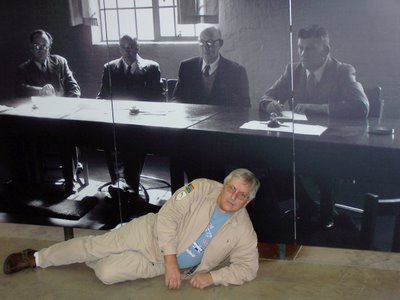Now, look carefully at those first two words! I challenge you to find the second one in a dictionary, an American dictionary that is. Yeah, yeah, I know what you're thinking...why is this guy using an American dictionary in South Africa?
It's called The American Heritage College Dictionary, the third edition, published by the prestigious Houghton Mifflin Company, out of Boston and New York. The cover proudly indicates this is the newest version of their dictionary--with over 200,000 definitions. And you will not find invigilating. I repeat, it's not in there! Importantly, I am going to leave said dictionary behind in the classroom I'm teaching in...a gift of (American) English language for my partner Fulbright educator now on summer vacation in Flint, Michigan, U.S.A.
I ask myself, "John, what have you been doing at school this past week?" I answer myself, "Why I've been invigilating!" But, wait a minute there, how in heck can you have been doing something that is not even listed in your authorative, third edition American Heritage College Dictionary? I am getting irritated and I shout back at myself, "Listen, you lout...I know what I've been doing and I definitely know where I've been doing it!"
You see, invigilating means one is proctoring an examination at a school in which one is employed--said person is supervising students, in this case "learners", at a South African School. My Fulbright colleagues are doing the same exact thing at their respective schools. I have not heard any complaints from them though. Our invigilating is more intense, I believe.
I'm told if you are a good invigilator, you must keep moving, walking up and down, up and down those narrow aisles. I carefully watched how it is done. One must have a stern look on one's face, glancing from side to side, making sure no one is copying, passing notes, or heaven forbid, actually trying to cheat by sneaking a peek at something scrawled in pen on a wrist, sole of a shoe, or on a shirt cuff.
Invigilating is tiresome work. First of all, all the floors I was invigilating on were made of concrete. If we invigilators were permitted to wear roller-skates, it would really lesson the wear and tear on the leg muscles. Not to be, of course!
I noticed the word "vigil" within the invigilating word. It felt rewarding to find vigil in my American dictionary. But then my "reward" turned into confusion: the definition read that vigil meant keeping a watch during normal sleeping hours! I was invigilating from 8a.m. until about 2p.m. each day last week. This was not during so-called normal sleeping hours. Ahah! My dictionary went on to give a secondary definition for vigil: The act or period of observing, surveillance. So that was it, I was like a security guard and this was an act of surveillance!
While I was invigilating in a room full of 8th-graders, I noticed an English dictionary. It was printed in London. To my great surprise, I found invigilate in the dictionary published in England. Not satisfied, I went back to the inner cover of the American Heritage Dictionary and found a section titled "Expert Usage Guidance."
Scanning that, I read that the guidance is based on the most current linguistic research and on an opinion poll from the distinguished American Heritage Usage Panel, a group of many well-known writers, educators, scholars, and public figures who are noted for their excellent command of the English language.
How could these "experts" in the English language leave out invigilate? It's a question I've been pondering all weekend. I've slept on it. Dreamed about it. Woke up thinking about it. How could THEY be so wrong and the English so right? And the more I thought about it the more I came to the conclusion that the word invigilate is going to have to go!
The word sounds like something out of a medieval dungeon. You know, "I'm going to invigilate that wench for not bowing deep enough to my Lord!" Proctor sounds so much more civilized. One would be proctoring an examination. Say it slowly now: p...r...o...c...t...o...r...i...n...g! Since nothing else has worked out to well here for me, I think my one major contribution will be to begin a movement to change invigilating to proctoring. Now THAT would be something significant, don't you think?
ADDITIONAL:
We're entering the second week of invigilating and some of my colleagues are becoming unglued--as in making asses of themselves over this stuff. There have been several "incidents", but I'm only going to touch on one. This one happened today, Wednesday, June 14.
I'm invigoratingly invigilating in the school auditorium (most refer to it as a "hall"). This time it is only about three-quarters full...senior learners doing a very well constructed Geography examination. Someone in the very back of the hall asks for the time and I show her my watch. Suddenly I notice that the (white) clock in the front of the large room has a glare on it--making it impossible for certain kids in the room to see what time it is. Usually the remaining time is written on a chalkboard in the room; there is no chalkboard in the front of the hall.
In a very dutiful manner, I ask a colleague (who happens to be invigoratingly invigilating at a much faster pace than I would dare to take), if it would be okay if one of us notified the learners of the correct time. Answer: NO! Reason: You would be breaking the RULES by talking to the learners during an examination! Hmmmmmmm, let's see now...I observed this same colleague chit-chatting with some of the kids taking the exam during her invigoratingly invigilating walking, back-and-forth, back-and-forth, back-and-forth, back-and-forth, etc. (you get the idea, right?).
I mildly protested, saying some of the learners cannot see the clock, etc. "Shhhhhhhhhhhh!", she loudly responded. She added, "Don't talk when the learners are taking an exam!" Well, I slid over to the side of the hall, my tail between my legs. I said no more... Someone came to relieve me (we do this shifts, thank goodness). I sauntered off to yet another room to invigoratingly invigilate again.
My point with this particular addition is this: Some people take rules too seriously. You know the saying, "Rules were made to be broken." You see, I don't give a damn if Caesar gave the order not tell a hall full of kids what time it was (especially if they couldn't see the sundial because of glare), when time is a critical factor in an examination with pencil and paper.
Yeah, and please don't come back at me with something like: "The Romans crucified anyone who didn't follow their laws (rules)". Go ahead, nail me to a cross...throw me to the lions! And please, please don't give me that line, "When in Rome...".
My hypothesis is: People who BLINDLY follow rules are fools (yes, yes...it rhymes). One should ask questions, dig a little deeper, look for alternative methods, hunt down multiple perspectives, and challenge people who stiffly rely on "rules" that don't make sense. What you have just read is part of my educational philosophy. Perhaps you wouldn't want your child to take an examination in MY school?
ADDITIONAL...TO THE ADDITIONAL:
Phew! After twelve hours of "scoring" examinations on Father's Day, I'm entering the third and last week of what I'm now going to describe as "Exam Hell." I learned all about Exam Hell by studying the Japanese. Besides the fact that I've been to Japan twice (both times on grants from funding institutions), my (then) family hosted a Japanese girl for a year. It has been some time ago, but I'm sure Mitsuko is doing very well in her pursuits.
Unfortunately, Exam Hell in South Africa is not what learners have to endure--it's what the teachers suffer through. Speaking of Hell, my wife was mad as Hell over the examinations that had to be attended to on MY special day! Hell, she even pitched in and helped me correct some of the 8th-grade learners papers. The reason why she was mad as Hell was because we would have enjoyed going out as a family and celebrating my status as head of the family...on Father's Day. No way, Jose'. Our family day was spent all day scoring examination papers of my 8th-grade learners.
All of the above brings me to this disturbing thought: Gee, I wonder what the South African Department of Education fat-cat bureaucrats were doing on Father's Day? Please forgive me for "thinking outside the box" that I am currently relegated to, but I'd also be willing to bet administrators at schools throughout S.A. also celebrated Father's Day with their families. Must be nice, huh?
Well, only three more days to go with this invigilating, scoring, Exam Hell routine. Maybe I'll get lucky and not have a teacher-colleague insult or berate me in the time remaining. Then again, my luck here in South Africa hasn't been what could describe as "lucky." Wish me luck...
FINAL Additional Message:
It's Thursday: Only one more day of this torture. Three weeks of running from room to room, either invigilating or attempting to keep a room full of 8th or 9th graders quiet as they "study" for the next examination. I've noticed that few really study; most waste their time by "goofing off" or reading something not relevent to the waiting exam. Pity. It is much the same back in Flint, Michigan...no seriousness of purpose regarding the age-old testing mechanisms. After 30-something years of teaching, I can pretty much look at a kid and tell you if said youngster will succeed on a test/examination, call it what you will. The lazy, "I-could-care-less-ones" stand out...anywhere (Flint or Kempton Park...makes no difference).
Enough of this! Tomorrow we shove off for Botswana, then snake our way toward Victoria Falls. It's gonna be fantastic to see/feel/smell what has fascinated so many for so many centuries (I'm referring to the roar of the water, of course). The invigilating routine won't be missed, that's for sure! I'll return with much more vigor restored, what with all the fresh air, dynamic, roaring waters, and meeting up with friendly indigenous peoples who could care less whether I'm a "good" invigilator or not. That will truly be invigorating (to forget the invigilating)!


